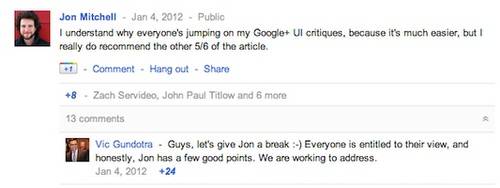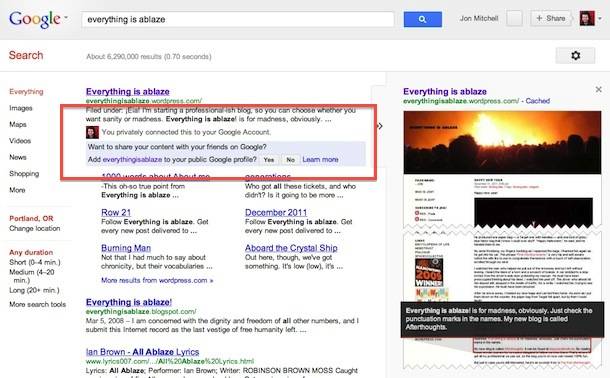Google shipped some major changes to search today. The announcement was called “Search, plus Your World.” It was the inevitable launch of the integration between Google’s core product, Web search, and its new identity
service, Google+. There are now two modes of search on Google, personal and global. Personal search shows users stuff from their Google+ circles, and global search is good old Google search, albeit with public Google+ posts included.

Before today, Google+ was shoved into Web search in uncomfortable ways. Public Google+ posts interfered with natural search when users were logged in. It looked like Google was going to force its social product into its users’ lives. But that’s not how it turned out. Today’s updates put Google users’ identities into their own hands.
We’re still testing whether public Google+ posts are getting undue influence in global search mode. It is possible that Google is still giving preference to its own services. It has been known to do that in other categories, such as place results and videos. But today’s updates to search changed one thing profoundly: Google’s users do not have to use Google+ anymore.

As 4chan’s Chris Poole so eloquently said last year, Google was moving toward a monolithic identity like the one Facebook offers. It seemed as though the only “you” that would matter on Google would be your Google+ profile. Last week, I couldn’t take it anymore. I said Google+ was going to mess up the Internet by causing us to all rearrange our online identities around our Google+ profiles. I feared it would be the only way to matter in Google search.
To my surprise, Vic Gundotra himself saw where I was coming from. “Honestly, Jon has a few good points,” he wrote. “We are working to address.”

Little did I know, a huge overhaul of Google’s search interface was less than a week away. When Google Fellow Ben Gomes showed me around, I was astonished by the extent to which users could control the experience. For those who want no part in this social search business, there’s a total opt-out switch in search settings. If you stick with social search, as I plan to try to do, there’s a toggle button to switch between personal and global modes.
That was enough for me to give the feature a chance. It’s not evil if you can turn it off. But today, as I’ve been playing around with the new Google, I observed one of the new features in action, and I’m even more intrigued now.

I don’t have the new personal search available yet, but some of the underlying new features are already working. When I searched for “everything is ablaze,” the name of my personal WordPress blog, I was presented with a new set of options. Right inside the search result, it asked whether this was my blog. I hadn’t added this to my Google+ profile yet, because it’s for crazy, personal stuff, and I use my Google+ profile for work.
I indicated that yes, this is me. It then asked me a second question: Did I want to add Everything is ablaze! to my public Google profile? I said ‘no,’ and that was that. If I understood what happened correctly, people connected to me in personal search will now find my blog because it is by me, but I’m still free to keep that invisible in my profile.
That’s the way I want it. My online identity is bigger than Google+. It includes a bunch of blogs, a podcast and a Twitter account, which is my main presence. That Twitter account is already listed in my Google+ profile. So will my tweets surface in Google’s social searches for me? I’ve been led to believe so.
Google’s Definition of “Your World”
John Battelle posted his reservations about today’s update, lamenting the fact that Google’s personal search would lean so heavily on Google+ and Picasa content but not include Facebook’s, for example. I agree with that complaint; we should be able to express our online identities however we want on whatever services we choose.
Danny Sullivan at Search Engine Land asked Amit Singhal about this, and here’s what he said:
“Facebook and Twitter and other services, basically, their terms of service don’t allow us to crawl them deeply and store things. Google+ is the only [network] that provides such a persistent service. … Of course, going forward, if others were willing to change, we’d look at designing things to see how it would work.”
MG Siegler doesn’t believe it will happen. It’s healthy to remain skeptical about that. But even before I got social search, Google indicated to me that it’s looking for me on other services. It let me indicate that my WordPress blog is me. That’s a social signal that will affect personal search, and it doesn’t come from Google+.
It’s true that Google’s personal search will present Google-hosted content more attractively and with more features. I can’t retweet a Twitter result from right inside Google search. But my Google profile associates my Twitter account with me. Yes, Twitter and Google’s relationship is on ice. But tweets are ultimately Web pages, Google sees them, and it asks whether that Twitter account is you. The implementation might not live up to the ideal, but at least Google is trying to let our other Web identities be a part of us.
Facebook? Twitter? Your thoughts?
UPDATE 1:23 p.m.: MG Siegler got a response from Twitter about today’s update:
“For years, people have relied on Google to deliver the most relevant results anytime they wanted to find something on the Internet.
Often, they want to know more about world events and breaking news. Twitter has emerged as a vital source of this real-time information, with more than 100 million users sending 250 million Tweets every day on virtually every topic. As we’ve seen time and time again, news breaks first on Twitter; as a result, Twitter accounts and Tweets are often the most relevant results.
We’re concerned that as a result of Google’s changes, finding this information will be much harder for everyone. We think that’s bad for people, publishers, news organizations and Twitter users.”
Sure they’re concerned. Is it true, though? It’s not like Twitter’s own search tools are that helpful; Google is still the best Twitter search tool there is. It recently acquired Julpan, a social search company, so maybe Twitter has a better idea. But if you search for content that’s on Twitter, Google will find it. If Twitter wants full-featured integration into Google search, that’s up to them. I’m sure Google would be delighted to oblige.
Nothing about today’s update makes things worse for Google’s competitors in Google results. If anything, it just means they have more work to do.
UPDATE 1/11 8:07 a.m.: Yesterday evening, Google posted a snide response to Twitter on Google+ suggesting that the collapse of the Google-Twitter real-time search deal was Twitter’s fault. It also says that Google has observed Twitter’s rel=nofollow instructions, so that Google cannot fully crawl Twitter users’ streams.
Google Chairman Eric Schmidt told Search Engine Land yesterday that Google is perfectly willing to talk about integrating Facebook and Twitter into social search. The problem is that it has to happen on those companies’ terms. If they could just strike a deal, social search would be great for users. Let’s hope they work out their little tiff.
















